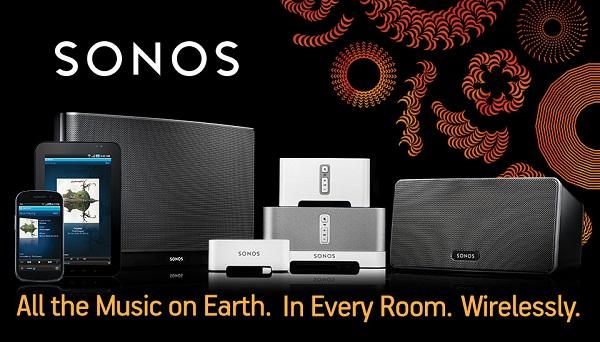I knew something like this would be coming down the line at some point. The moment I read that the new Play:5 has built in microphones that aren't currently being used but could be unlocked via future firmware upgrades I knew they had plans to take on Alexa.
Where Is Sonos Heading?

Sonos is a privately held company, so its business is, well, its own business. Judging by its steady stream of new products and stellar published reviews and word-of-mouth recommendations, I figured the future of Sonos was well-charted and sunny.
Thus I was surprised to read last week's blog post by John MacFarlane, the company's co-founder and CEO. Titled "Navigating an Industry in Transition, Investing in the Future of Music," it seems that Sonos is not happy with the status quo, and is ready to re-invent itself. Is that the sign of a company that shrewdly sees the future before anyone else and begins preparing for it, or a company that has hit its first identity crisis?
After recapping his successful bet on WiFi, Mr. MacFarlane says, "Today, the entire music ecosystem is in transition—ultimately for the better—and so is Sonos.... The short term—and very difficult—consequence of this decision is we've had to make some changes to our team. We do this with a heavy heart, as we are in the process of letting go of some Sonos employees who have played roles in getting us to this point. We wish them well..."
Then, he charts the future for Sonos: "As we look to the future there are two big areas that we're leaning into: paid streaming services, and voice control." In other words, after founding and building a terrifically good wireless streaming speaker company, Sonos is now tackling two new challenges. Regarding streaming, Mr. MacFarlane states, "We believe that listeners will grow increasingly dissatisfied with the [paid subscription] solutions they've cobbled together for listening at home." He does not spell out what exactly Sonos will do to solve the cobbling problem, but apparently he somehow envisions a playback experience that is easier to use than a Sonos app.
Regarding the second challenge, voice control, Mr. MacFarlane is quite clear: "We're fans of what Amazon has done with Alexa and the Echo product line....the Echo found a sweet spot in the home and will impact how we navigate music, weather, and many, many other things..... Voice is a big change for us, so we'll invest what's required to bring it to market in a wonderful way."
In other words, Sonos acknowledges that Echo has stolen its thunder. Amazon released Echo ($180) in 2014, marketed it heavily, and it has been extremely successful. Its voice control, backed by a powerful cloud-based AI, makes it Siri-like in its ability to find and play music, as well as control other smart home products. It is one of the most exciting products since, well, the first Sonos products.
To stay competitive, Sonos has evidently decided that if cannot rest on its laurels. It must leave its comfort zone and invent newer tech. To do this, in some respects, to grow the company, it must risk the company. It has a lot going for it. It has, arguably, the best wireless speaker technology and importantly it also integrates Apple Music. Sonos also has more than adequate corporate firepower; reportedly, it will have $1 billion in sales this year. This comes only 14 years after its founding. Sonos is a player.
But it has its work cut out for it. Pioneering WiFi speakers was about 50% vision and 50% money. Getting in the music subscription and voice control business right now is about 10% vision and 90% money. That's because Sonos is arriving late to this party and moreover will go up against the biggest players around. Creating a WiFi speaker was one thing; competing against giants is something else.
Something like voice control is easy. But developing and supporting the cloud-based AI that makes it smart is extremely expensive. It would be a Herculean task to develop that from scratch; I suspect that Sonos will partner with someone or at least license the AI technology. Meanwhile, Amazon certainly won't be standing still. In fact. it has recently launched two spin-off products, the Echo Dot ($90) and the Amazon Tap ($130).
Mr. MacFarlane laments, "These last few weeks have been tough for everyone at Sonos." I suspect the next few months and years will be tough as well. But based on its vision and success so far, I am betting that Sonos will do well in its new endeavors. I can hardly wait to see what they come up with.
- Log in or register to post comments































































